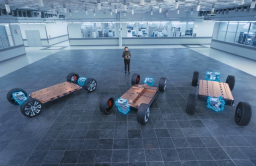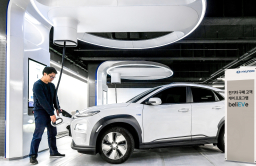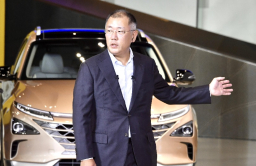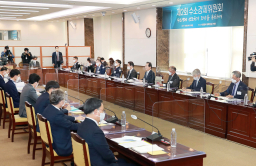-
KOSPI 2577.27 -2.21 -0.09%
-
KOSDAQ 722.52 -7.07 -0.97%
-
KOSPI200 341.49 +0.02 +0.01%
-
USD/KRW 1396 -2.00 0.14%
Hyundai Motor, LG Energy team up on EV battery leasing, recycling
EV ecosystem
Hyundai Motor, LG Energy team up on EV battery leasing, recycling
By
Feb 18, 2021 (Gmt+09:00)
2
Min read
News+
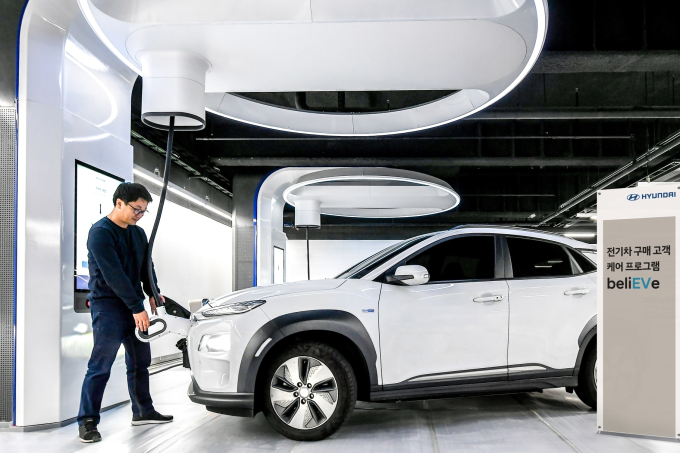
The Hyundai Motor Group will lead a government initiative to reduce battery-related environmental problems by collaborating with other companies on electric vehicle battery leasing and recycling.
Hyundai Glovis Co., a logistics unit of the automotive group, LG Energy Solution Ltd. and KST Mobility Co., which operates EV ride-hailing platform Macaron Taxi, signed a memorandum of understanding with the Ministry of Trade, Industry and Energy on Feb. 18.
The signing ceremony was held at Hyundai Motor’s Namyang R&D Center, with the attendance of Prime Minister Chung Se-kyun, Hyundai Motor Group Chairman Chung Euisun and LG Energy Solution CEO Kim Jong-hyun.
Under the initial agreement, KST Mobility will buy a fleet of electric cars from Hyundai Motor Co. and hand over the ownership of batteries to Hyundai Glovis – a transaction that will lower the initial EV purchasing costs for the taxi platform operator.
COOPERATION TO CUT EV PURCHASING PRICE
For a pilot program of the industrywide cooperation, Hyundai said it will sell 20 units of the Kona electric subcompact SUV to KST Mobility next month. Hyundai’s Kona EV is priced at around 47 million won ($42,420), and the purchasing price will go down to about 20 million won with state subsidies minus the battery costs.
Electric taxis need to change batteries every two to three years, so Hyundai Glovis will collect used batteries and sell them to LG Energy for recycling as well as using them to make energy storage systems (ESS) for recharging electric cars.
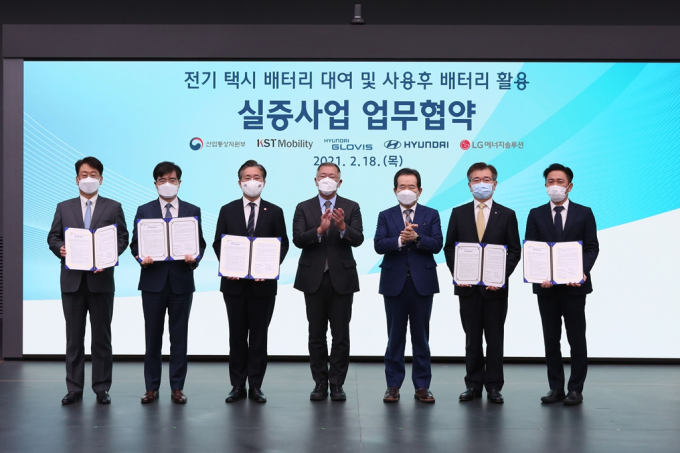
Hyundai Motor, the country’s largest automaker, has already obtained government permission to collect used EV batteries to build energy storage containers.
The agreement comes as the number of scrapped EV batteries is expected to rise steadily in line with the government’s green energy initiative, which promotes the use of electric vehicles and hydrogen fuel cell cars.
According to the state-run Korea Energy Economics Institute, the number of scrapped EV batteries is forecast to rise rapidly to some 80,000 units a year by 2029.
KOREA’S GREEN INITIATIVE
Earlier on Thursday, Prime Minister Chung presided over a government meeting, where officials set the proportion of eco-friendly cars such as battery EVs and hydrogen-powered cars at 10% of total auto sales in Korea in 2021.
They also made it mandatory for all new vehicle purchases by government agencies this year to be eco-friendly cars, with an aim to raise the country’s accumulated green cars to 300,000 units by year-end.
As part of efforts to strengthen its EV battery business not just in Korea but in overseas markets, Hyundai Motor signed an agreement in November last year with Singapore’s state-run utility firm SP Group to promote the launch of electric cars and establish an EV-charging infrastructure in the city state.
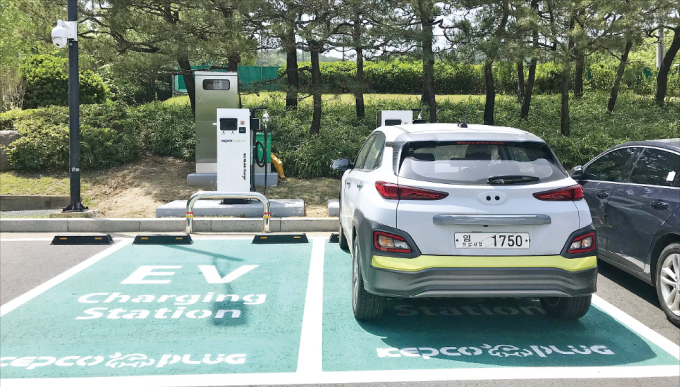
Under the deal, Hyundai Motor said it will supply its EVs to Singapore and seek business opportunities through the battery-as-a-service (BaaS) business model in Southeast Asia.
BaaS encompasses services such as EV battery rental, repair, recharge, reuse and recycling.
Write to Il-Gue Kim and Ji-Hoon Lee at Black0419@hankyung.com
In-Soo Nam edited this article.
More To Read
-
Feb 17, 2021 (Gmt+09:00)
-
Nov 12, 2020 (Gmt+09:00)
-
Oct 14, 2020 (Gmt+09:00)
-
Oct 15, 2020 (Gmt+09:00)


